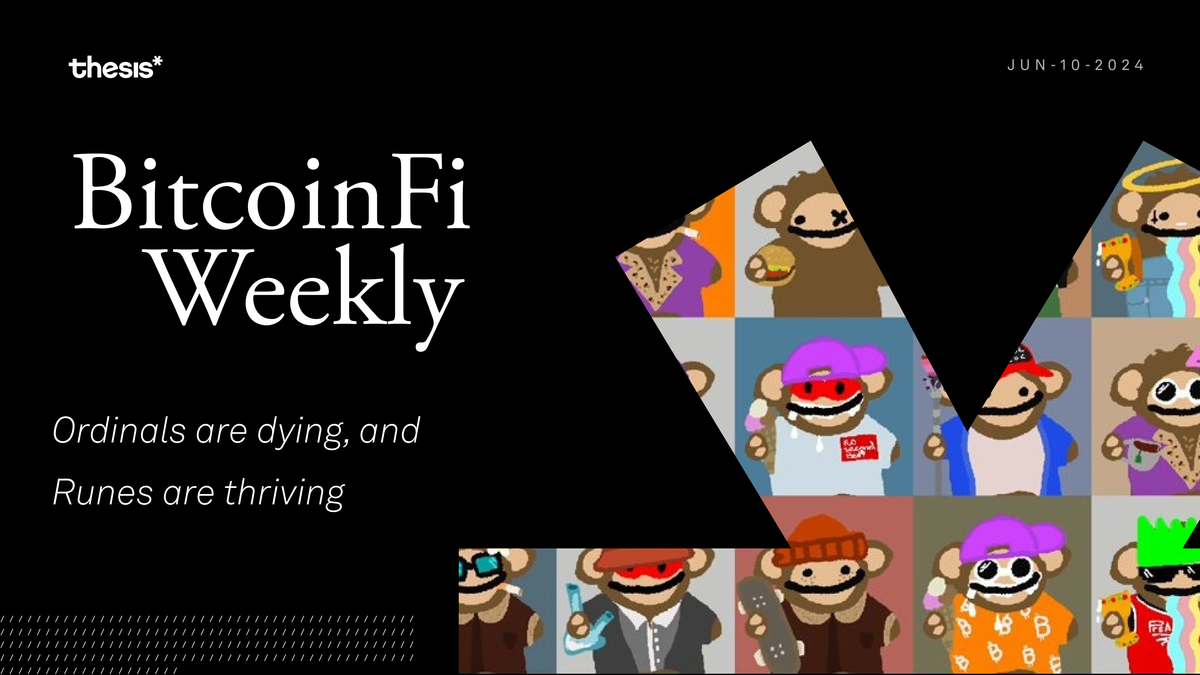Welcome to the BitcoinFi Weekly, where we dive into all things BitcoinFi.
WTF is BitcoinFi?
A recent blog post outlined that BitcoinFi is the dynamic economic system built on and around Bitcoin. It exists today, with yield on tokenized forms of BTC, cheap and accessible BTC-denominated payment rails on the Lightning Network, and BTC savings strategies offered by newly established, crypto-friendly banks.
But BitcoinFi isn’t finished—Bitcoin can be used for much more. In a comprehensive financial ecosystem*,* Bitcoin is a store of value and a dynamic asset powering a wide range of economic activities.
In this newsletter, we'll chart the weekly happenings within BitcoinFi: where people use their BTC and what is changing in the Bitcoin world.
Is there anything you want us to cover? Reach out at [email protected]
Here’s this week’s rundown:
- 🏦 BTC is the best form of collateral
- 🧠 Bitcoin L2s are still getting significant attention
- 🐱 The CAT is back: OP_CAT’s path to implementation looks promising
- 🌩️ Lightning just onboarded 100m users
- 🗣️ Pitch your app idea to BOB’s team and investors at ETHCC
Let's get into it.
Updates in BitcoinFi
Ethena’s USDe — Bitcoin Backed Stables going mainstream
BTC is nearly 50% of the collateral for Ethena’s stablecoin, USDe.
USDe started the year at $100m in outstanding supply and is now at $3.5b. Though the mechanism for USDe is heavily debated, the velocity of this stablecoin and its growth within DeFi are undeniable. And now that BTC is backing over 1.6B worth of this stablecoin’s value, it again proves BTC is a viable form of collateral.
Stacks Active Accounts ATH
Stacks network active accounts hit an ATH at 131k.
While everyone eagerly awaits the deployment of Stack’s Nakamoto upgrade, Stacks network activity is still strong. Nakamoto will introduce sBTC, Stacks’ tokenized Bitcoin, and improve block and transaction times on the network.
Protocols like StackingDAO and ALEX are seeing a majority of network activity.
Bitlayer TVL is up more than 200m since May
Bitlayer is a PoS sidechain that could integrate with BitVM in the future to enable a trustless two-way BTC peg for bridging.
The protocol’s “Leaderboard Competition” Epoch 1 finished, with Avalon Finance holding the majority of new protocol TVL.
Runes aren’t dead yet
Runes are still getting daily FUD, but the metrics don’t fully align with the narrative.
Runes transactions still make up more than 50% of transactions on the Bitcoin network, and the total market cap for all runes tokens still sits at 1.1B, down from the ATH of 2.2B.
Rune's share of network fees is still small relative to regular BTC transfers, which account for over 90% of the fees paid to miners. Nonetheless, Runes are the only other transaction type accounting for a significant percentage.
Ordinals are dead
New inscriptions and fees paid by Ordinal transactions have aggressively plateaued, only increasing 2% and 1.5%, respectively, since April 21st.
Previous top collections NodeMonkes, OrdinalMaxiBiz (OMB), and Bitcoin Puppets are all seeing sharp declines in their floor price.
OP_CAT - Coming soon?
SVK's “Bitcoin Review” podcast recently featured a team of Bitcoin contributors discussing OP_CAT.
OP_CAT enables covenants on Bitcoin, creating a path for smart-contract programmability that allows for trustless forms of bridging, arbitrary token swapping, zk verification, and more.
Sentiment within the podcast felt optimistic about a future with OP_CAT.
Check out the “BIP Land” section of the website for an up-to-date and thorough tracker of the path to OP_CAT implementation on the Bitcoin network.
tBTC Yield on Silo
Silo Finance, an isolated lending protocol on Ethereum, Optimism, and Arbitrum, walked through some ways to access BitcoinFi today with their tBTC pools.
From low-risk lending to higher-risk wBTC and tBTC looping, Silo is showing that BitcoinFi exists and is accessible today thanks to bridges like wBTC and tBTC.
Bitcoin L2s are EVM Maxis
Bitcoin Layers, the L2Beat for Bitcoin, show that over 60% of current and proposed scaling projects will use the Ethereum Virtual Machine.
The EVM is an instant way to onboard developer activity, a user base, and a familiar ecosystem of apps.
The downside? The market is currently showing its hand that EVM L2s are not the flavor of the day anymore. Recent launches like ZKSync, Blast, Mode, and many more show a fatigued interest in these newer EVM projects.
Project Highlight
Build on Bitcoin (BOB) is a Bitcoin/Ethereum rollup that currently uses Ethereum for consensus and operates as an Ethereum optimistic rollup. Soon, BOB will go live with its merged mining security, which will be the first implementation of Bitcoin-level security for the network.
BOB has been live for almost two months and currently has over $50M in TVL on the network, used within various Bitcoin applications.
The team hosted a “Shark Tank” event at ETHCC, where teams showcased their project ideas to the BOB team and a panel of investors.
Lightning Going Mainstream
Nubank, the largest fintech bank in Latin America, recently announced support for Lightning Network payments, opening up Lightning Network to Nubank’s 100 million customers.
Improved adoption among large banks like Nubank is bullish for Bitcoin. Adoption of completely trustless and non-custodial scaling platforms like Lightning is bullish for Bitcoin. Lightning is approaching ATHs for network capacity, which is undeniably bullish for Bitcoin.
The positive aspects of this announcement should not be overlooked. But looking ahead one, two, or five years, how likely is it that Nubank customers will use the Lightning network? Looking at the market today, it doesn’t feel that probable.
Lightning, like many other forms of Bitcoin applications, can be an onboarding experience for people who are first stepping into Bitcoin. With applications like Lightning, the value of decentralized, permissionless money can become tangible for its users.
But over time, Bitcoin has moved to a “Store of Value” narrative within the public eye, while peer-to-peer money feels less and less impactful. Stores of value are not something you spend but save and grow over time.
Lightning has grown significantly over the past two years, according to a recent report from River. As of September 2023, there were between 279k and 1.116 million monthly active Lightning users (the privacy features of Lightning make it difficult to pinpoint exact figures).
The River report also found that the average Lightning transaction size was around 44.7k satoshis, or $11.84, in August 2023. Lightning is showing its dominance for low-value transactions paid in BTC, but the Bitcoin L2s that are building a programmable, productive Bitcoin economy will be able to far better serve Bitcoin holders.
Builders in the Lightning Network ecosystem recognize the user's appetite for yield. Stroom, a liquid staking platform for Lightning, recently launched a statistics dashboard for its staked BTC on Lightning. Stroom's simple yield on Lightning will be useful, but it will not overcome the fact that yields from supplying BTC for Lightning Network channels are minimal.
While developments improving Lightning's economic properties are promising, the network's underlying structure is not built for BitcoinFi. Newer Bitcoin layers incorporating potential technical improvements (like OP_CAT and/or BitVM) or projects like BOB and Mezo will be able to create on-chain economies and useful products that Bitcoin holders seek.
Closing Thoughts
Thank you for tuning in to this week's BitcoinFi Weekly. From Bitcoin-backed stablecoins to advancements in the Lightning Network, Bitcoin is increasingly integrating into our financial system, and we're excited to watch the continued growth.
If there's a topic you’d like us to cover or have questions, reach out at [email protected].
Learn more about Mezo in the following channels:
👾 Discord:https://discord.mezo.org
🕊 X:https://twitter.com/MezoNetwork
🖥 Website:https://mezo.org
🏦 Deposit Portal:https://mezo.org/hodl
ℹ️ Docs:https://info.mezo.org

